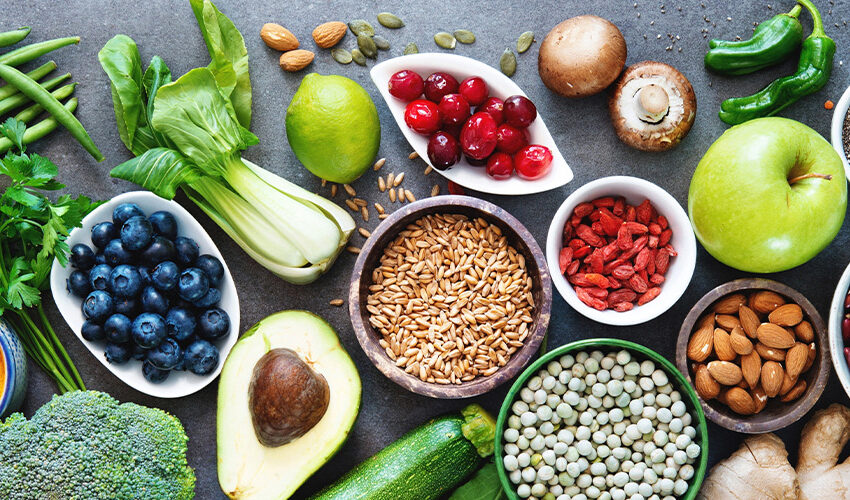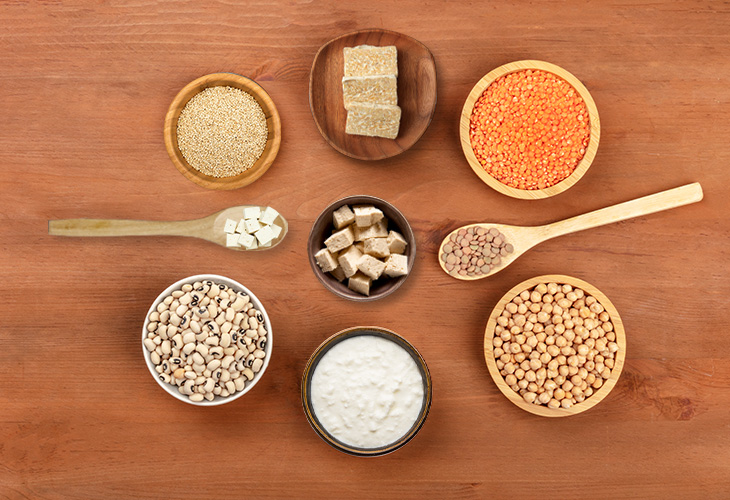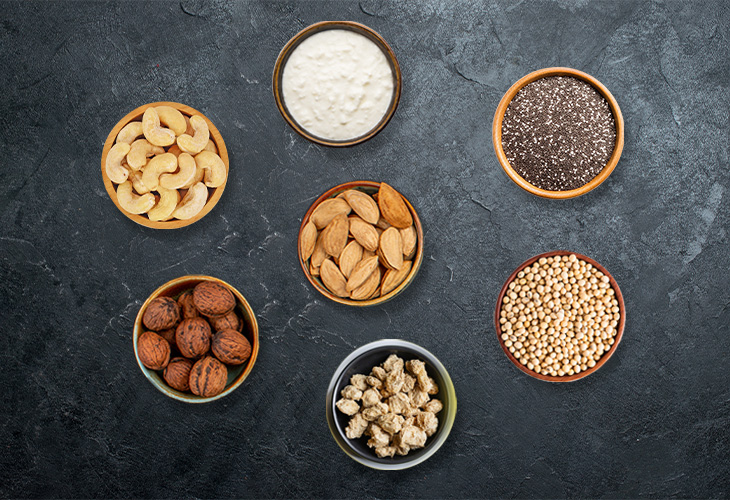
- October 28, 2024
- Balanced Diet
Maintaining a balanced and protein rich diet is essential for vegetarians, whether you want to build muscle, maintain energy, or support overall health. While protein is often associated with animal products, there are plenty of plant-based foods that are packed with this crucial nutrient. In this guide, we’ll explore some of the best protein rich foods for vegetarians and how to incorporate them into your daily meals.
Why Is Protein Important?
Protein is one of the essential macronutrients our body needs to function properly. It plays a key role in:
– Building and repairing tissues
– Supporting immune function
– Producing enzymes and hormones
– Maintaining muscle mass and strength
– Providing energy when carbohydrates are not available
For vegetarians, it’s important to find diverse sources of protein to ensure you meet your body’s needs, especially since plant-based proteins can sometimes lack one or more of the essential amino acids found in animal products.
I see the mistake—cottage cheese (paneer) was listed twice in the blog. I’ll revise the section by removing the duplicate and correcting the sequence.

Best Protein Rich Foods for Indian Vegetarians
- Dals (Lentils)
Lentils are a staple in Indian households and are packed with protein. About 18 grams of protein can be found in a cup of cooked lentils. Additionally, lentils are rich in fibre, which supports digestion.
How to Use: Enjoy dals as part of your daily meals by preparing traditional Indian dishes like dal tadka, sambar, or dal makhani. Lentils also go well in salads and soups.
- Chickpeas (Chana)
Chickpeas, or chana, are commonly used in Indian cooking and provide about 15 grams of protein per cup. They are also rich in fibre, iron, and folate.
How to Use:
Prepare popular Indian dishes like chole, add chickpeas to salads, or make hummus. Roasted chickpeas make for a great snack too.
- Paneer (Indian Cottage Cheese)
Paneer is a widely used ingredient in Indian cuisine and provides about 18 grams of protein per 100 grams. It’s a great vegetarian option for adding protein to your meals.
How to Use: Incorporate paneer into dishes like palak paneer, paneer tikka, or paneer bhurji. You can also add it to curries, salads, or parathas.
- Tofu and Tempeh
Tofu and tempeh, made from soybeans, are becoming more popular in India as vegetarian protein sources. Tofu contains around 10 grams of protein per 100 grams, and tempeh provides around 19 grams.
How to Use: Use tofu or tempeh in Indian-style stir-fries, curries, or salads. You can also marinate and grill them as a substitute for paneer in dishes like paneer tikka.
- Quinoa
Although not native to India, quinoa has gained popularity as a complete protein source, providing all nine essential amino acids. One cup of cooked quinoa offers 8 grams of protein.
How to Use: Use quinoa as a replacement for rice or mix it with vegetables for a protein-packed khichdi or pulao.
- Greek yoghurt(Dahi)
Greek yoghurt, or thick dahi, is an excellent source of protein, containing about 10 grams of protein per 100 grams. It also supports gut health due to its probiotic content.
How to Use: Enjoy Greek yoghurt with parathas, as a raita, or as a base for smoothies and dips. It can also be used in place of cream in gravies for a healthier twist.
- Edamame (Soybeans)
Though less common in traditional Indian diets, edamame or young soybeans contain around 17 grams of protein per cup. They’re also rich in vitamins and fibre.
How to Use: Enjoy steamed edamame as a snack with a sprinkle of chaat masala, or add them to salads and stir-fries.
- Seitan (Wheat Gluten)
Seitan is a meat-like protein source with 25 grams of protein per 100 grams, making it one of the richest plant-based proteins.
How to Use: Use seitan in Indian dishes like kebabs, and stir-fries, or even as a meat substitute in biryanis and curries.
- Almonds and Other Nuts (Badam, Akhrot, Kaju)
Nuts like almonds, walnuts, and cashews provide a solid amount of protein. For instance, a quarter cup of almonds contains 8 grams of protein.
How to Use: Snack on a handful of almonds, mix nuts into your morning oats or yoghurt or grind them into a paste to enrich gravies like shahi paneer or korma.
- Chia Seeds
Chia seeds are tiny but mighty, providing around 4 grams of protein per two tablespoons. They are also packed with omega-3 fatty acids.
How to Use: Sprinkle chia seeds on yoghurt, blend them into smoothies, or prepare chia pudding with coconut milk and jaggery.
Bonus Protein Rich Foods
- Peas (Matar)
Green peas, or matar, are often used in Indian dishes and contain about 8 grams of protein per cup when cooked.
How to Use: Add peas to curries like matar paneer, pulao, or even aloo matar. You can also blend them into soups or use them in samosas.
- Spinach (Palak)
Spinach, or palak, while not as high in protein as other foods on this list, still offers 5 grams of protein per cup when cooked, along with iron and calcium.
How to Use: Prepare palak paneer, add spinach to dals, or include it in smoothies and stir-fries for an added nutrient boost.

How to Incorporate Protein Rich Foods into a Vegetarian Diet
To ensure you’re getting enough protein as a vegetarian, it’s important to include a variety of these protein-rich foods in your diet. Here are a few tips for incorporating them:
– Mix and match protein sources: Combine different plant-based proteins, such as lentils and quinoa or beans and rice, to ensure you’re getting all essential amino acids.
– Snack smart: Choose protein-packed snacks like roasted chickpeas, nuts, or edamame for a healthy energy boost between meals.
– Add protein to every meal: Aim to include a source of protein in each meal. For example, add tofu or tempeh to stir-fries, top salads with quinoa or nuts, and enjoy a yoghurt parfait for breakfast.
Conclusion
For vegetarians, there’s no shortage of protein rich foods to choose from. By incorporating a diverse range of these plant-based proteins into your diet, you can meet your nutritional needs while enjoying flavorful and satisfying meals. Whether it’s lentils, tofu, or quinoa, you’ll find plenty of delicious ways to stay healthy and energized.
This guide provides vegetarians with various options for meeting their protein requirements in a healthy, balanced way.
